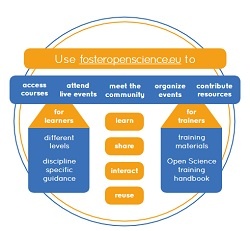Austrian Initiatives to move Open Science & Research Data forward
04/04/2017

(Credit: Wikipedia; LEARN project poster at RDA PLENARY in BARCELONA, April, 2017)
Austria continues the transition to Open Science while promoting multiple new initiatives, including innovative projects on the transition to Open Access, data archives, research data management infrastructures, and Open Education. By 2025, all scholarly publication activity in Austria will be Open Access. Find out what plans has Austria in store to be at the forefront of open scholarship.
________________________________________________________________________________________________
|
Free access to scholarly publications in the internet (Open Access, OA) belongs to the hot sub-topics of Open Science and the current international research policy, as OA aims to increase the visibility, use, and impact of research output, and thereby generate added value for the scientific community. Supporting measures for the transition to OA includes the redesigning of license agreements with publishers, as well as, spurring researchers into publishing through OA agreements and encouraging new OA strategies for publications (view: OA journal business models; Alternative Publishing Models to Support OA). |
The Austrian funding and research organizations have a very good starting position since they have achieved several OA agreements with publishers like IoP Publishing, Royal Society of Chemistry, Taylor & Franics and Sage. Besides that, of particular importance are the Springer Compact Agreement, and the Vienna Principles.
Based on 16 Recommendations for the Transition to OA in Austria (developed by Open Access Network Austria: OANA), all scholarly publication activity in Austria should be OA by 2025. That means that the final versions of all scholarly publications resulting from the support of public resources must be freely accessible on the Internet without delay (Gold OA).
The Austrian Science Fund (FWF) has:
- provided books accessible free of charge in the FWF E-Book Library and in the OAPEN Library. The OAPEN Library’s annual data on book usage shows that the number of archived open-access books is rising steadily, as is the number of downloads per book;
- called for support of the Expression of Interest in the Large-scale Implementation of OA to Scholarly Journals initiated by the Max Planck Society (OA2020 – The Initiative).
Austrian Transition to Open Access - AT2OA is a new project involving 21 Austrian Universities under the lead of the University of Vienna. Its aim is to contribute to the transformation from Closed to Open Access of scholarly publications.
IST Austria is committed to provide unrestricted and cost-free online access to scientific publications for all users and researchers as widely as possible.
As a certified repository, AUSSDA – THE AUSTRIAN SOCIAL SCIENCE DATA ARCHIVE aims to systematically collect, document and disseminate digital quantitative data, and to guarantee its long-term availability, along with any accompanying documentation, while adhering to international standards. AuSSDA is integrated within the European ESFRI roadmap via its membership in the Consortium of European Social Science Data Archives (CESSDA).
In the context of research data management, of particular note is the first e-Infrastructures Austria project. The importance of this project has been demonstrated in its results and many initiatives arisen out of it. In this context, it is worth noting a survey conducted on the handling of research data in Austria and directed at the scientific personnel of 20 public universities and three Austrian research institutions. As a result, templates for data management plans (DMP) were prepared, as well as, publications, guidelines, FAQ’s and other deliverables from cluster groups.
TUNE IN!This week (3-7 April, 2017) data scientists, librarians, computer scientists, and domain scientists will gather in Barcelona for the 9th Research Data Alliance Plenary Meeting! #RDAPlenary meetings are special working events that help move the research data community forward, improving data sharing across disciplines, technologies, and countries, with goal of supporting institutions in their quest to better deal with the challenges of Research Data Management. |
FIND OUT MORE about open science and research data:
- Open Science Monitor : access to data and trends on open science (AIMS, 2017)
- Research Data Management : Training Materials (AIMS, 2017)
- INRA2025 : Open Science priority, Data sharing and much more (AIMS, 2017)
- Slovakia: Open Education and Open Science in Open Government Partnership Action Plan 2017-2019 (OpenAIRE, 2017)
- Swedish OpenAIRE event “Opportunities in Open Science” (OpenAIRE, 2017)
- 2017 CASRAI International Research Data Management glossary (IRiDiuM) Working Group (AIMS, 2017)
- Moving Open Access Implementation Forward (AIMS, 2017)
- Re-using Open Data ...: a new European Data Portal study report (AIMS, 2017)
- RRI Tools: fostering Responsible Research and Innovation (AIMS, 2016)
- LEARN : LEaders Activating Research Networks. Towards a common model on Research Data Management Policy and Data Management Plans (AIMS, 2016)
- FOSTER project: Facilitate Open Science Training for European Research
- E-INFRASTRUCTURES: Making Europe the best place for Research and Innovation (booklet, European Commission, 2016)
